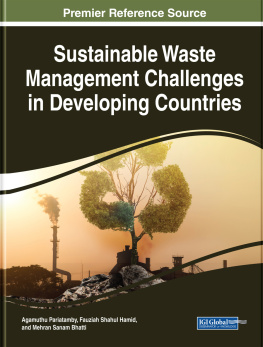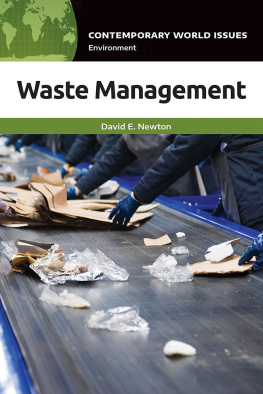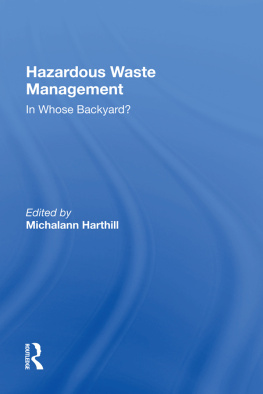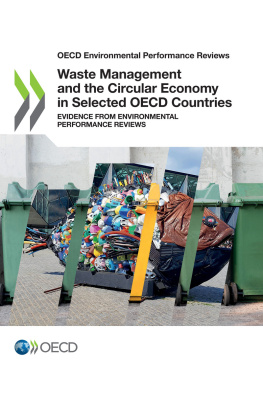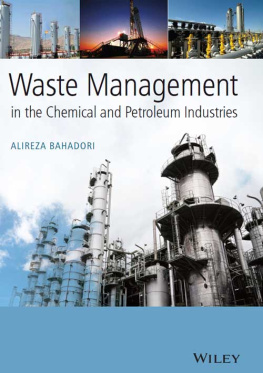Chapter 1
Sustainable Waste Management Challenges in Argentina
- Atilio Armando Savino
Association for Solid Waste Studies (ARS), Argentina - Ernesto de Titto
ISALUD University, Argentina
ABSTRACT
A general picture of waste management in Argentina is presented, taking into consideration the obligations of the state to guarantee the collection of household waste and to dispose of it in authorized sites and the generators responsibility on the management of hazardous waste. Separate boxes are presented to present the activities performed by organized waste pickers and by CEAMSE, a state-owned company responsible for waste disposition in the metropolitan area of Buenos Aires. Waste management is essential for a sustainable development agenda. As witnessed in Argentina, this requires (1) closing open dumpsites, (2) a reliable and complete waste collection service, and (3) proper treatment of all waste streams. It is thus clear the need to (1) promote a circular economy; (2) tackle the management of organic waste; (3) ensure the adequate control and treatment of hazardous waste; (4) promote a suitable set of policies, regulations, and economic instruments; (5) select the best available technologies; and (6) formalize the informal phase of recycling.
OVERVIEW
In Argentina, local governments are legally obliged to guarantee the collection of household waste and to dispose it in authorized sites. This can be done by the State itself or by hiring third parties.
The situation is different for hazardous waste whose management is under the responsibility of the generator (industries, stores, universities, healthcare centers, etc.), who must perform source separation, temporary storing at adequate storage and employ the authorized transporters and operators for transporting, treating and final disposal.
Several locations adopted regionalization models for municipal waste management that has reaped benefits for all the involved parties from the environmental and economic perspective. However, this model deserves further development especially since different technologies for treatment of different waste streams are required which are costly and necessitates a certain scale to be sustainable.
The recovery of recyclable materials from garbage must also be considered. Waste recycling is a growing practice nowadays. However, it is not rare meeting unorganized families collecting and selling materials that other people have considered waste, as a way of life. Thus, people of different age, including kids, without personal protection elements, handle waste daily without even taking into account the implication this activity has on their health.
Besides, although legally forbidden it is not rare abandoning waste in public sites, especially in the periphery of largest cities. It is known that uncontrolled burning and open dumpsites with the expected consequences of environmental impacts on the air, soil and surface and underground water, associated with several health risks, should be avoided.
Solid waste treatment plants and sanitary and secure landfills, such as any work project or activity with entity to cause an impact in the environment are required by the environmental legislation to carry out an Environmental Impact Assessments procedure prior to its habilitation. Nevertheless, the so-called NIMBY effect1, especially in connection with the selection of sites intended for sanitary landfill still is a relevant issue in Argentina. Communities rejection to have a sanitary landfill nearby is frequent, affecting the possibility of having sites suitable for the final disposal of waste.
In these troubled situations, a number of faults are immediately noticed that derive basically from pending issues of governments that go beyond the site itself, such as: 1) most cities have grown in a disorganized and unplanned manner, being it difficult to find examples of consistent works that pertain environmental management of the territory; 2) the weak control of the premises by the authorities and the scarce information regarding design, operation and monitoring of the sites; 3) the lack of timely inclusion of the citizens in the decision making process, and/or in choosing the opportunity to provide information to the community and 4) the low impact of communitarian opinions. In many conflicting cases the governments make huge efforts to explain facts and supply information when the conflict has already been unleashed.
COUNTRY PROFILE
The Argentine Republic extends over the south of the American continent, the islands of the South Atlantic and part of Antarctica. The surface of its continental region is 2,791.810 Km2 and that of Antarctica and the islands of the South Atlantic of about a million Km2 (969.464 Km2).
The country spans in latitude from the Tropic of Capricorn to the South Pole, and in longitude from the highest peaks of America in the Andes to sea level on the Atlantic coasts, which determines a wide variety of climates.
The wetlands in the East of its territory comprise forests and subtropical mountains and the Pampas Plain in which the main agricultural and livestock activities of the country are developed. The arid and semiarid zones occupy two thirds of the surface of Argentina. They have a high variability in their landscape with xenophiles forests, areas with deserts, mountain and spinal, in the North and central region. In the South there is the Patagonia, almost all arid and with strong winds.
The population of the country at the end of 2015 was over 43 million inhabitants with a proportion of the urban population of about 91%. The Argentine population has grown in the period 2000-2015 at an average annual rate of 10.7 per thousand. The average density is 15 inhabitants per Km2. The distribution is very uneven and most of the population is concentrated in the largest urban centers.
According to official data (PAHO-Argentine Ministry of Health, 2018), Argentina's crude birth rate is 18 per thousand, while mortality is 7.7 per thousand. Infant mortality of live births is 9.7 per thousand, having declined since 1980, when it rose to 33.2 per thousand. Life expectancy is about 75 years, having increased in two years, compared to that recorded in the early nineties. In the case of women life expectancy is 79 years and in men of 72 years.
| Figure 1. Map of Argentina |
|---|
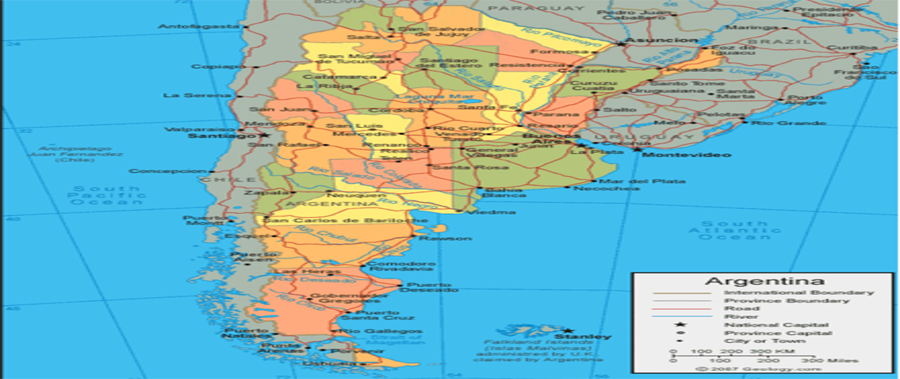 |
There is a growing demographic ageing: while at the beginning of the nineties the percentage of older adults (over 65 years old) was 8.9%, currently it is 10.4% of the population. At the same time, the number of young people (up to 14 years) in the total population has been reduced from 30.6% in 1991 to 25.1%.
Argentina is a Republican, representative and federal state; it has a decentralized political-administrative organization formed by 2253 municipalities in 23 provinces and the Autonomous City of Buenos Aires (CABA) as presented in Fig. 1. In Environmental Matters and according to the basic principles of the National Constitution, each province enjoys the dominion and the administration of its natural resources. The Nation has among its faculties to dictate the norms with the minimum budgets of environmental protection (Law 25,675).
With a Gross Domestic Product (GDP) of more than US$500 billion, Argentina is one of the largest economies in Latin America.
Argentina has vast natural resources in energy and agriculture. Within its 2.8 million square kilometers of territory, Argentina is endowed with extraordinary fertile lands and has great potential for renewable energy. It is a leading food producer with large-scale agricultural and livestock industries. In addition, Argentina has significant opportunities in some manufacturing subsectors, and innovative services in high tech industries.

